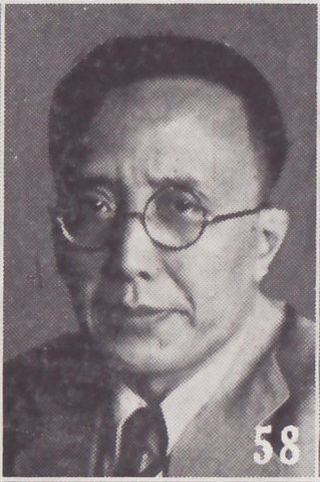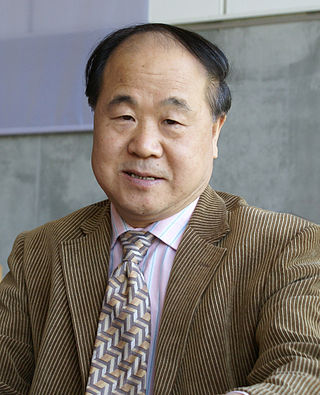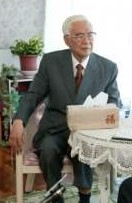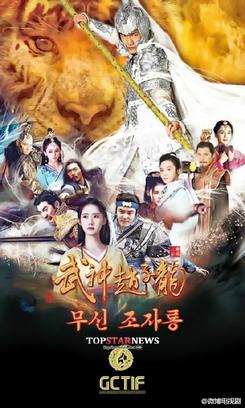Related Research Articles

Shu Qingchun, known by his pen name Lao She, was a Chinese novelist and dramatist. He was one of the most significant figures of 20th-century Chinese literature, and is best known for his novel Rickshaw Boy and the play Teahouse (茶馆). He was of Manchu ethnicity, and his works are known especially for their vivid use of the Beijing dialect.

Shen Congwen, formerly romanized as Shen Ts'ung-wen, was a Chinese writer who is considered one of the greatest modern Chinese writers, on par with Lu Xun. Regional culture and identity plays a much bigger role in his writing than that of other major early modern Chinese writers. He was known for combining the vernacular style with classical Chinese writing techniques. Shen is the most important of the "native soil" writers in modern Chinese literature. Shen Congwen published many excellent compositions in his life, the most famous of which is the novella Border Town. This story is about the old ferryman and his granddaughter Cuicui's love story. Shen Congwen and his wife Zhang Zhaohe were married in 1933, Shen Congwen and Zhang Zhaohe had two sons and one daughter after their marriage.

Guo Moruo, courtesy name Dingtang (鼎堂), was a Chinese author, poet, historian, archaeologist, and government official.

Guan Moye, better known by the pen name Mo Yan, is a Chinese novelist and short story writer. Donald Morrison of U.S. news magazine TIME referred to him as "one of the most famous, oft-banned and widely pirated of all Chinese writers", and Jim Leach called him the Chinese answer to Franz Kafka or Joseph Heller. In 2012, Mo was awarded the Nobel Prize in Literature for his work as a writer "who with hallucinatory realism merges folk tales, history and the contemporary".

Bo Yang, sometimes also erroneously called Bai Yang, was a Chinese historian, novelist, philosopher, poet, and politician based in Taiwan. He is also regarded as a social critic. His best-known work is The Ugly Chinaman, a controversial book that was banned in Mainland China, in it he harshly criticized Chinese culture and the national character of Chinese people. According to his own memoir, the exact date of his birthday was unknown even to himself. He later adopted 7 March, the date of his 1968 imprisonment, as his birthday.

Yang Lian is a Swiss-Chinese poet associated with the Misty Poets and also with the Searching for Roots school. He was born in Bern, Switzerland, in 1955 and raised in Beijing, where he attended primary school.

Yang Jiang was a Chinese playwright, author, and translator. She wrote several successful comedies, and was the first Chinese person to produce a complete Chinese version of Miguel de Cervantes' novel Don Quixote.
Liu Heng is a Chinese writer. He is generally seen as a realist writer. He became a professional writer in the 1970s after having worked as a peasant farmer, a factory worker and a soldier, classes which have served as fodder for his stories and, not coincidentally, classes which Mao Zedong promoted as the audience for literature in his 1942 Talks At The Yenan Forum On Literature And Art. "Dogshit Food" won the 1985-86 best short story award. "Fuxi Fuxi" won him the national Prize for Best Novelettes in 1987, and was the basis for the film Ju Dou. His novel "Hēi de xuě", about the problems faced by a young juvenile delinquent upon his release from prison, was made into a feature film, and "Pínzuǐ Zhāng Dàmín dē xìngfú shēnghuó" has been made into a television series in the same name.
The Church of Almighty God, also known as Eastern Lightning, is a monotheistic new religious movement which was established in China in 1991. Government sources estimate the group has three to four million members.

The Prince of Han Dynasty is a three-season Chinese television series featuring a fictionalised life story of Liu Che, Emperor Wu of the Han Dynasty. Season 1 was first broadcast on Beijing Television in 2001 in mainland China, followed by the second and third seasons in 2003 and 2005 respectively. Except for Huang Xiaoming, who played Emperor Wu in all three seasons, the cast members in each season are almost different from its preceding one.

Xiao Ke was a general of the Chinese People's Liberation Army, former vice chairman of the CPPCC, as well as principal of the University of Military and Politics.
Dali L. Yang is an American political scientist and sinologist. He is the William Claude Reavis Professor in the Department of Political Science and Senior Advisor to the President and Provost on Global Initiatives at The University of Chicago. Between 2010 and 2016, he was the founding Faculty Director of the University of Chicago Center in Beijing, a university-wide initiative to strengthen exchanges and collaboration with Chinese academic institutions. He is also a non-resident Senior Fellow at the Chicago Council on Global Affairs. He is a member of the Committee of 100, a member of the National Committee on U.S.-China Relations, and a member of the China Committee of the Chicago Sister Cities International Program. He is also on the Advisory Board of the Paulson Institute at the University of Chicago.

Howard Goldblatt is a literary translator of numerous works of contemporary Chinese fiction, including The Taste of Apples by Huang Chunming and The Execution of Mayor Yin by Chen Ruoxi. Goldblatt also translated works of Chinese novelist and 2012 Nobel Prize in Literature winner Mo Yan, including six of Mo Yan's novels and collections of stories. He was a Research Professor of Chinese at the University of Notre Dame from 2002 to 2011.
White Snow, Red Blood (雪白血紅) is a book by Zhāng Zhènglóng (張正隆), a colonel in the People's Liberation Army, that was published in August, 1989 by the People's Liberation Army Publishing House. It concerns the history of the People's Liberation Army during the Chinese Communist Revolution. The book was severely criticized and suppressed in the spring of 1990, after about 100,000 copies had been sold.
Brian Holton is the translator of Chinese "Misty" poet Yang Lian. He translates into English and Scots, and is the only currently-publishing Chinese-Scots translator in the world.
Kenny Ho Kar-king is a Hong Kong actor and Cantopop/Mandopop singer. He was best known for his role as Zhan Zhao in the Taiwanese and Mainland Chinese television series Justice Bao from 1993 to 2012, and is also known for his roles in Master Ma and Super Hero. Ho is currently a businessman.
The China women's national artistic gymnastics team represents China in FIG international competitions.

God of War, Zhao Yun, also known as Chinese Hero Zhao Zilong, released under the title Dynasty Warriors in Indonesia, is a 2016 Chinese television series directed by Cheng Lidong and produced by Zhejiang Yongle Entertainment Co., Ltd. The series starred cast members from mainland China, South Korea and Taiwan: Lin Gengxin, Im Yoon-ah and Kim Jeong-hoon. The story is loosely adapted from the 14th-century Chinese classical novel Romance of the Three Kingdoms, with Zhao Yun as the main character. It was first aired on Hunan TV from 3 April to 7 May 2016.
The Galaxy Award is China's most prestigious science fiction award, which was started in 1986 by the magazines Tree of Wisdom and Science Literature & Art. After Tree of Wisdom ceased publication soon afterwards, the award was organized solely by Science Literature & Art, which was renamed to Science Fiction World in 1991.
Eric Abrahamsen is an American award-winning literary translator from Chinese to English.
References
- ↑ Binyan, Liu (November 6, 1988). "STARK TRUTH VS. 'FALSE REALISM': THE BOOK THAT STUNNED BEIJING (Published 1988)" – via NYTimes.com.
- ↑ "89-107 (Dissident Chinese Writers)". www.brown.edu.
- ↑ Spence, Jonathan D. "In China's Gulag" – via www.nybooks.com.